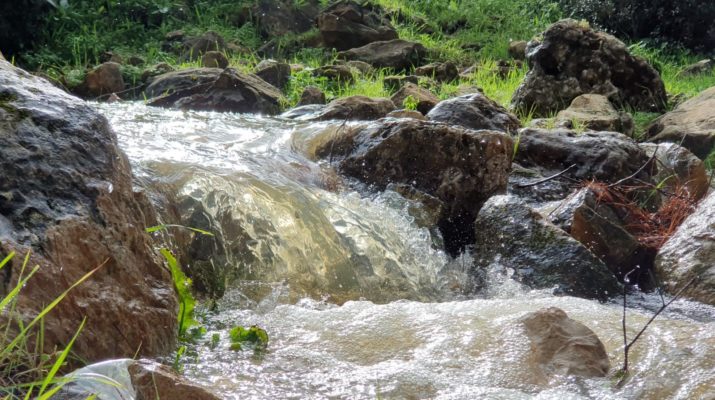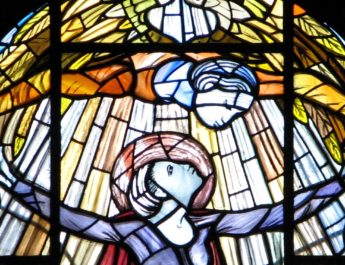Psalm 126
Ordinary B48
A Song of Ascents.A
1 When the LordB restoredC the fortunesD of Zion,E
we wereF like those who dream.G
A “Ascents” = ma’alah. From ma’aleh (ascent, platform, slope, stairs, cliff, elevation, a rise; figuratively, a priority); from alah (to go up, ascend, be high, be a priority; to arise in a literal or figurative sense). This is something that arises, elevation, a journey to a higher pane. This can be used figuratively to mean having a though or being of a superior status. It is often used in a specific sense for something the mounts to a climax. This is step, stair, or high degree.
B “Lord” = YHVH. From havah (to be, become) or hayah (to come to pass, become, be). This is the name of the God of Israel, the self-existent and eternal one, the tetragrammaton. This pronunciation has been lost to time so “Lord” is generally used in its place.
C “restored” = shub. To turn back, return, turn away – literally or figuratively. Doesn’t necessarily imply going back to where you started from. This is also the root verb for the Hebrew word for repentance “teshubah.”
D “fortunes” = shibah. Perhaps related to “restored” in v1. 1x in OT. From shebuth (prisoners or exile; figuratively, a previous condition of prosperity); {from shabah (to take captive, keep, a captor)} OR from shub (see note C above). This is captivity or restored fortunes.
E “Zion” = Tsiyyon. Related to tsyiyyun (signpost, monument); from tsavah (to charge someone, to command, order); from the same as tsiyyah (dryness drought); from a root meaning parched as desert, dry land. Zion can refer to a mountain in Jerusalem as well as another name for Jerusalem itself or the people.
F “were” = hayah. Related to “Lord” in v1. See note B above.
G “dream” = chalam. Properly, to bind solidly and so to be plump. This is to be healthy or strong, to recover; figuratively, to dream.
2 Then our mouthH was filledI with laughter,J
and our tongueK with shouts of joy;L
H “mouth” = peh. This is mouth in a literal or figurative sense. So, more literally, it can be beak or jaws. More figuratively, it refers to speech, commands, or promises.
I “was filled” = male. This is fill, satisfy, replenish, accomplish, fulfill, confirm, or consecrate. It is fill in a literal or figurative sense.
J “laughter” = sechoq. 15x in OT. From sachaq (to laugh, celebrate, joke, mock, scorn. This is laughing, whether for joy or scorn. It can imply plays or holding a contest). This is laughter, enjoyment, joke, sport, or mocking. It can be laughter from joy or for scorn.
K “tongue” = lashon. This is tongue, talker, language, or wedge. It can also be a tongue of flame or a water cove.
L “shouts of joy” = rinnah. From ranan (a cry of joy or a joyful song; properly, emitting a shrill sound, especially one of joy). This is a song, shout, cry of joy, or proclamation. It could also be a shout of grief.
then it was said among the nations,M
“The Lord has doneN great thingsO for them.”
3 The Lord has done great things for us,
and we rejoiced.P
M “nations” = goy. From the same root as gevah (the back, person, or body); related to gev (among); related to gaah (to rise up). This is nation or people. Often used to refer to Gentiles or foreign nations. It can also be used figuratively for a group of animals. This is where the Yiddish “goy” comes from.
N “done” = asah. This is to make, do, act, appoint, become in many senses.
O “great things” = gadal. This is to grow up, become great, become wealthy – to advance. The root meaning may be to twist in the sense of the process of growing.
P “rejoiced” = hayah + sameach. Literally, “are glad.” Hayah is the same as “were” in v1. See note F above. Sameach is from samach (to rejoice, be glad; properly, to brighten up; also used figuratively). This is glad or joyful.
4 Restore our fortunes,Q O Lord,
like the watercoursesR in the Negeb.S
5 May those who sowT in tearsU
reapV with shouts of joy.
Q “fortunes” = shebuth. Related to “fortunes” in v1. See note D above.
R “watercourses” = aphiq. 19x in OT. From aphaq (to be strong, force, control, hold). This is a channel, brook, stream, tube, river. It is something that contains so it is a tube or valley where a stream is. It can also be something strong or a hero.
S “Negeb” = Negeb. Root may mean to be parched. The Negeb is the south country – sometimes used to refer to Egypt. This is a land that suffers from a lot of drought.
T “sow” = zara. This is to sow or scatter seed, conceive or yield. It can also refer to a sower. Figuratively, this can refer to other forms of dissemination.
U “tears” = dimah. From dema (juice, liquor); from dama (to weep). This is tears from weeping.
V “reap” = qatsar. This is to cut down, be short, reap, curtail. It is used especially for harvesting grass or grain. Figuratively, it can mean to be discouraged or grieve.
6 Those who go outW weeping,X
bearingY the seedZ for sowing,AA
shall come homeBB with shouts of joy,
carryingCC their sheaves.
W “go out” = halak + halak. This is go, come, walk. It is walk literally and figuratively and includes people and animals. It can be used figuratively for one’s moral life – how we walk according to God’s way or against it. It can also refer to the walk of life as in the course one’s life takes, the choices we make, etc. The word is repeated twice – the first time as an Infinitive Absolute. The Infinitive Absolute serves to emphasize the sentiment of the word. It is rather like Foghorn Leghorn’s speech pattern, “I said, I said.”
X “weeping” = bakah. This is to weep, complain, or lament.
Y “bearing” = nasa. This is to lift in a broad sense, literally and figuratively. So it could be to carry, take, or arise. It could also be bring forth, advance, accept.
Z “seed” = zera. Related to “sow” in v5. From zara (see note T above). This is seed or sowing. It can, thus, mean a fruit, plant, sowing time, child, offspring, or posterity.
AA “sowing” = meshek. 2x in OT. From mashak (to draw, drag, or pull; to sow, march, remove, draw along, continue, extend, or prolong). This is a drawing up, bag, sowing, possession, price.
BB “come home” = bo + bo. This is to enter, come in, advance, fulfill, bring offerings, enter to worship, attack. It can also have a sexual connotation. The word is repeated twice – the first time as an Infinitive Absolute. The Infinitive Absolute serves to emphasize the sentiment of the word. It is rather like Foghorn Leghorn’s speech pattern, “I said, I said.”
CC “carrying” = nasa. Same as “bearing” in v6. See note Y above.
Image credit: “Winter Flow in Nahal Kana” in the West Bank of Israel by Yair Dov, 2021.




